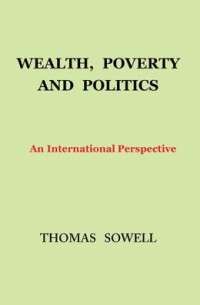Wealth, Poverty and Politics
Wealth, Poverty and Politics: An International Perspective is a book by American economist and social theorist Thomas Sowell. It was originally published by Basic Books in 2015, with an updated version published in 2016. In the work, Sowell argues against the notion that economic equality is natural, and examines geographic, cultural, social, and political factors that have contributed to the wealth of groups and nations.
 First edition cover | |
| Author | Thomas Sowell |
|---|---|
| Country | United States |
| Language | English |
| Genre | Non-fiction |
| Publisher | Basic Books |
| ISBN | 0465082939 |
Reception
In a review for The Independent Review, Gary M. Galles of Pepperdine University stated that Sowell "thinks carefully and creatively through widely held premises and the narratives they support, bolstering his analysis with a vast array of evidence that offers insights for the intellectually curious". Galles argued that the author is effective in showing how "massive variations in access to ideas and culture, as well as goods and services, overwhelm any expectation of equality of productivity".[1] In The Washington Times, Wes Vernon lauded the book as a "calmly phrased but damning indictment", praising Sowell's "mountains of research" as disproving opposing arguments.[2] A reviewer for Publishers Weekly wrote, "Open-minded readers will find Sowell’s directness, honesty, and common sense refreshing and often wise."[3] Walter E. Williams gave the 2016 updated edition a positive review, particularly praising the discussion of earnings differences.[4]
Not all reviews were positive. In The Washington Post, Steven Pearlstein argued that Sowell's pinning of the blame for black poverty on multiculturalism and welfare is unconvincing, and added that "ghetto culture" cannot explain the problems in white America. Pearlstein wrote that the book "is filled with such instances of overreach" and stated, "What we [...] learn from Wealth, Poverty and Politics is that there is apparently no level of inequality of income or opportunity that Thomas Sowell would consider unacceptable."[5]
References
- "Book Review | Wealth, Poverty and Politics: n International Perspective by Thomas Sowell". The Independent Institute. Retrieved 2018-09-02.
- http://www.washingtontimes.com, The Washington Times. "BOOK REVIEW: 'Wealth, Poverty and Politics: An International Perspective'". The Washington Times. Retrieved 2018-09-02.
- "Nonfiction Book Review: Wealth, Poverty and Politics: An International Perspective[em] [/em] by Thomas Sowell. Basic, $28.99 (312p) ISBN 978-0-465-08293-3". PublishersWeekly.com. Retrieved 2018-09-02.
- Williams, Walter E. "Wealth, Poverty and Politics". Townhall. Retrieved 2018-09-02.
- "Here's why poor people are poor, says a conservative black academic". Washington Post. Retrieved 2018-09-02.